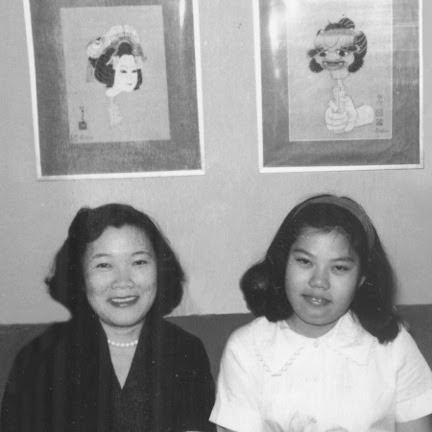By Shizue Seigel

My mother and me in 1960 beneath Japanese prints of Bunraku puppet-heads.
Mom hid inside her immaculate house because she was hazukashii, terrified of embarrassment and humiliation. She limited her world to her house, her secretarial job, and her family–my dad, who was seldom present even when he was home, and me, her only child.
“I only need one friend at a time,” she’ declared. When she was between friends, which was often, she pressed me into service as companion and confidante. She kept up a monologue as we did the chores together. She was the innocent victim in all her stories. If was my job to listen sympathetically, soothe her hurt feelings and encourage her as she agonized about how clumsy, stupid and shy she was. She blamed her shortcomings on being a military wife, forced to move every two or three years; she blamed them on camp; she blamed them on losing her dad when she was 13; she blamed them on the mean girl who stole her friend in second grade; on having to repeat first grade; on her critical mother, who was matter-of-factly competent at everything.
After we finished our chores, Mom would stand me next to her in front of the bedroom mirror and compare our features one by one.
“Too bad. You have the same stubby feet that I do.” I stared ruefully at our wide Japanese peasant feet, size 5C feet, with short stubby toes that looked chopped off rather than tapering gracefully.
“And daikon ashii.” Radish legs, meaning that our shinbones bowed outwards and the insides of our knees had fat pads that made us look knock-kneed.
“And wide hips.” But good for childbearing, I consoled myself.
“But at least you have a small waist.” In those days, movie stars were voluptuous, not anorexic, so having a 24" waist and 36" hips was a good thing. Mercifully she skipped over the 32” bust without comment. She didn’t rub it in that she wore a B-cup to my A.
“You have nice wide shoulders, but they make your neck look short.” She tilted her head to admire the feminine downslope of her own shoulders.
“And you have your father’s teeth.” She pulled back her lips to admire even, white teeth, so different from my horsey yellow ones.
“Too bad you didn’t get Daddy’s nice high nose. Yours is as flat as mine.”
“But you look OK from here up,“ she said, blocking the lower half of my face with her hand. “At least you have nice eyes, just like Daddy’s.” None of us had “Japanese-y” monolids. But my eyes disappeared into slits when I grinned. Mom never grinned.
“But too bad your hairline is so messy!” She smoothed her own perfect widow’s peak with a self-satisfied gesture and sighed. “At least you’re smart, anyway.”
Maybe my mother meant well, but those afternoon sessions did a lot more for her ego than mine. She was a good-looking woman, which I was not destined to be. A photo from that period brings startling clarity to a dynamic that took me decades to understand. Mom relieved her own feelings of inadequacy by transferring them to me. In the photo, Mom is as pretty and perfect as the female puppet head in the print above her, while I’m looking as confused, ugly and angry as the hapless puppet above my own head.
I tried to measure up to Mom’s standards. I grudgingly donned the stiff cotton bras, the garter belts and nylons expected of young ladies. But I hated the clothes Mom bought for me. My hose got runs as soon as I donned them. And frosted pink lipstick clashed with my sallow skin and smeared onto my front teeth when I smiled.
For Mom, lipstick was a soothing sacrament to beauty, the last thing she put on before she left the house, and the armor she reapplied after every meal, peering into her little purse
She never went downtown without impeccable white gloves and a hat with a little veil. They were her talismans against the hard stares of strangers. As for the occasional clerk who ignored her as she waited to be served, she was positive we were snubbed because we were Japanese American.
“Did you notice,” she’d hiss under her breath as we left the premises, “she served two other people before us.”
I hadn’t noticed. I was too busy worrying that that Mom would notice that my slip was showing.
About the Author: Shizue Seigel is a Japanese American writer and artist whose passion for social justice, creativity and compassion arise from her immigrant grandmother’s Buddhism and her family’s incarceration during World War II. As an Army brat, she dropped out of both college and the model minority to become a hippie, a traveler, and an art director who finally finds herself at home working with poor African American women in public housing. She is an active member of the Asian American arts community and is completing a memoir, Miss Goody-Good Grows Up, with support from a San Francisco Arts Commission Individual Artists Commission.
